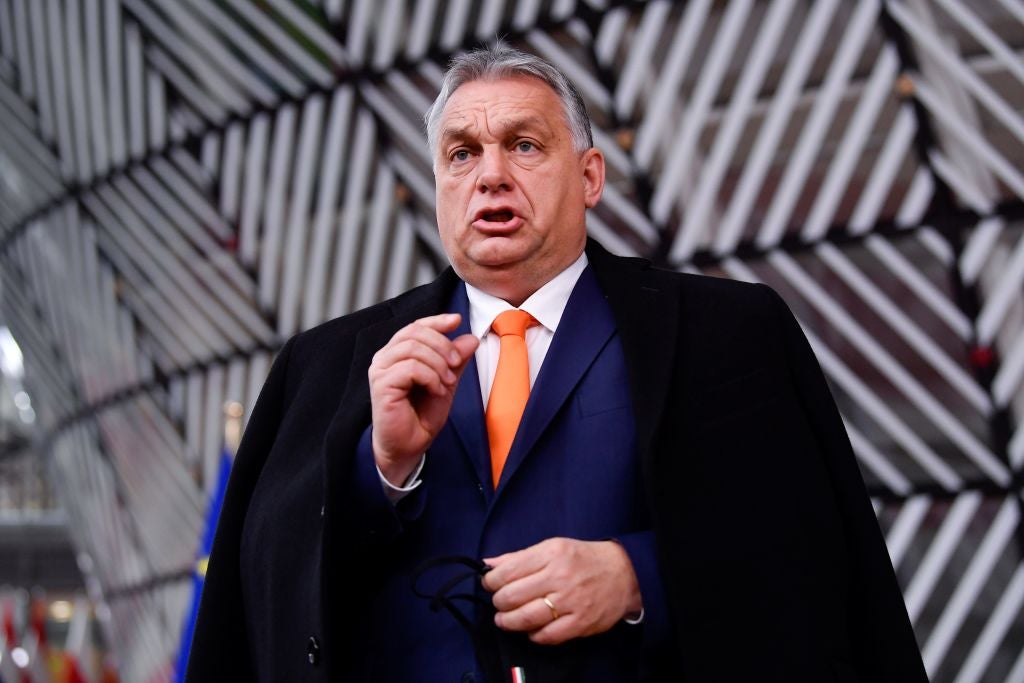Will the EU stand by as Viktor Orban attacks independent media in Hungary?
As another independent radio station is forced to close, the EU should uphold its principles on free press and investigate the monopoly of state media in Hungary


Your support helps us to tell the story
From reproductive rights to climate change to Big Tech, The Independent is on the ground when the story is developing. Whether it's investigating the financials of Elon Musk's pro-Trump PAC or producing our latest documentary, 'The A Word', which shines a light on the American women fighting for reproductive rights, we know how important it is to parse out the facts from the messaging.
At such a critical moment in US history, we need reporters on the ground. Your donation allows us to keep sending journalists to speak to both sides of the story.
The Independent is trusted by Americans across the entire political spectrum. And unlike many other quality news outlets, we choose not to lock Americans out of our reporting and analysis with paywalls. We believe quality journalism should be available to everyone, paid for by those who can afford it.
Your support makes all the difference.My morning drive to the office in Budapest has always been accompanied by the sound of Klubrádió, one of Hungary’s few remaining independent media outlets. But my listening habits will soon have to change. This radio station, which is refreshingly critical of Viktor Orban's government, has become the latest in a long line of media outlets to face closure.
The National Media and Infocommunications Authority (NMHH), the state agency responsible for the distribution of radio channels, secured a court ruling this week that will result in the discontinuation of Klubrádió’s license from 15 February 2021.
The official reason given is that the station “has repeatedly violated the provisions of the Media Act”, by missing deadlines to report to the Media Council on the composition of their programmes – including the exact ratio of news and Hungarian music broadcast. The station has paid its fines for these minor breaches. But the suspicion of many, including myself, is that these technicalities are being used by the authority to shut down a media foe, in a politically driven and shameful attack.
Klubrádió is an interactive community radio station that covers world events with humour, empathy and sometimes anger. In truth, its left-wing agenda is not always to my taste, but those in search of news free of government influence in Hungary now have few choices.
Most Hungarian radio channels have been transformed into pro-government outlets. News programmes trumpet government achievements only to be interrupted by government ads; political debates are non-existent. Instead, listeners are overwhelmed by propagandistic political interviews and commentaries of so-called “political experts” who tirelessly belittle the political opposition. Pro-government media communicates a simple message: the liberal world, including the EU, is united against Hungary – and only the government of Viktor Orban can save the country.
The NMHH, which oversees the media and telecom sectors, was established in 2010 after Orban won a supermajority in parliament. Its president, who was nominated by Orban, also doubles up as the chairperson of the National Media Council, which has broad sanctioning powers over all media. The system of “dual appointments” gives the government de facto control over the council, which is entirely made up of ruling party loyalists.
In the last decade, the Hungarian media has largely come under de facto state control. In that time, hundreds of radio channels disappeared while others changed owners and political profile. Today the vast majority of radio listeners in Hungary only have access to news from pro-government radio stations. After an effort to suspend Klubrádió’s licence in 2013 failed, the media authority limited the station’s reach to the capital Budapest.
The huge expansion of the pro-government media empire became visible when, following Orban’s latest election victory in 2018, 476 media outlets – TV, radio, printed news, and online news alike – were centralised in one giant pro-government media holding. Orban granted this private company special status as being of “national strategic importance”, which exempted it from the scrutiny of the competition authority. The European Commission last year cited this merger as a reason why the Hungarian media market is “at high risk”. Reporters without Borders (RSF) ranked Hungary 89th out of 180 countries in their 2020 World Press Freedom Index, a significant decline since Orban returned to power in 2010. Alongside other press freedom organisations, RSF concluded in December 2019 that there was “a degree of media control unprecedented in an EU Union member state”.
Hungary’s media transformation has been driven by successive takeovers of independent media companies by government-friendly business interests. The last such example was the takeover of Index, once Hungary’s leading independent online portal, in the summer of 2020, which resulted in the resignation of almost the entire newsroom. The pro-government businessman involved in the Index takeover, Miklos Vaszily, helped to turn Origo, another popular independent media outlet, into a pro-government mouthpiece in 2014.
Orban has weaponised the advertising budgets of ministries, government agencies, and state companies, providing 75 per cent of the state’s advertising expenditure to pro-government media companies. Meanwhile, independent media are starved of funds. This advertising largesse represents 60-70 per cent of the total income of several outlets, proving a high level of government influence, as Hungarian investigative portal Átlátszó found. Private advertisers have followed the lead of state companies and favour pro-government publications. This has resulted in the bankruptcy of several independent outlets, including some with Swiss and German owners. Once bankrupt, these publications have been bought up by proprietors with pro-government sympathies, increasing the government’s control over Hungary’s media landscape. A recent study showed that 44 out of 87 media outlets of national importance in Hungary are connected to the governing elite.
As an open critic of the Orban government, Klubrádio lost its advertisement income nearly a decade ago and was forced to introduce a crowdfunding model.
European politicians, particularly members of the European People’s Party to which Orban’s Fidesz party still belongs, have so far been quiet on the threat to Hungary’s last radio station that openly criticises the government. They must urgently investigate the potential misuse of EU funds to undermine media freedom and pluralism in Hungary, while also standing up for independent journalism in the country. EU funds should serve to build a common Europe, not to undermine democracy.
There is no free election without a free and balanced press. With the silencing of Klubrádió, it’s not just my morning commute that will suffer. Europe will have failed to stand up for its most fundamental values.
Zsuzsanna Szelényi is a former Hungarian politician and expert in foreign policy, who started her career in Fidesz, which she represented in parliament from 1990 to 1994




Join our commenting forum
Join thought-provoking conversations, follow other Independent readers and see their replies
Comments